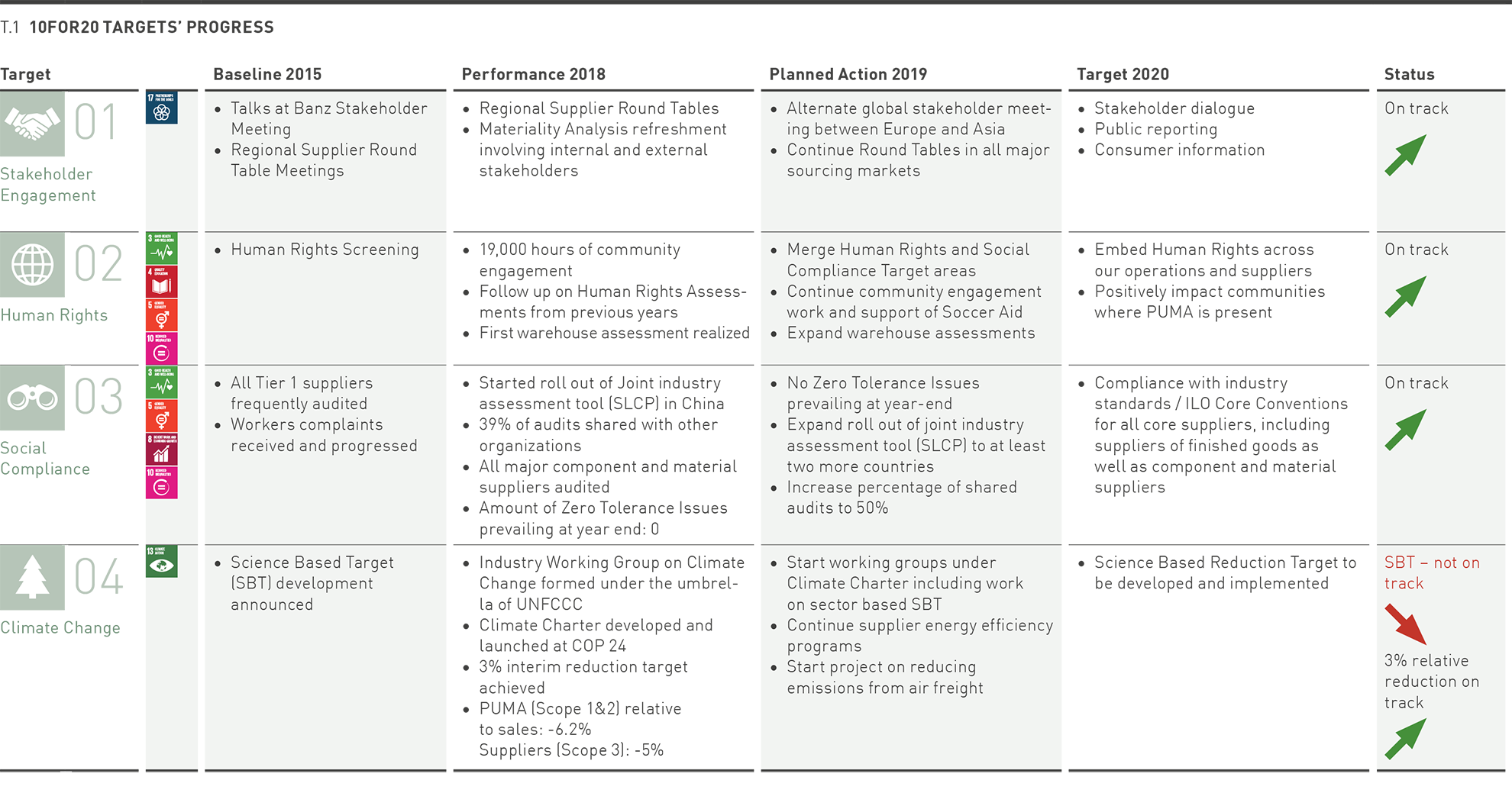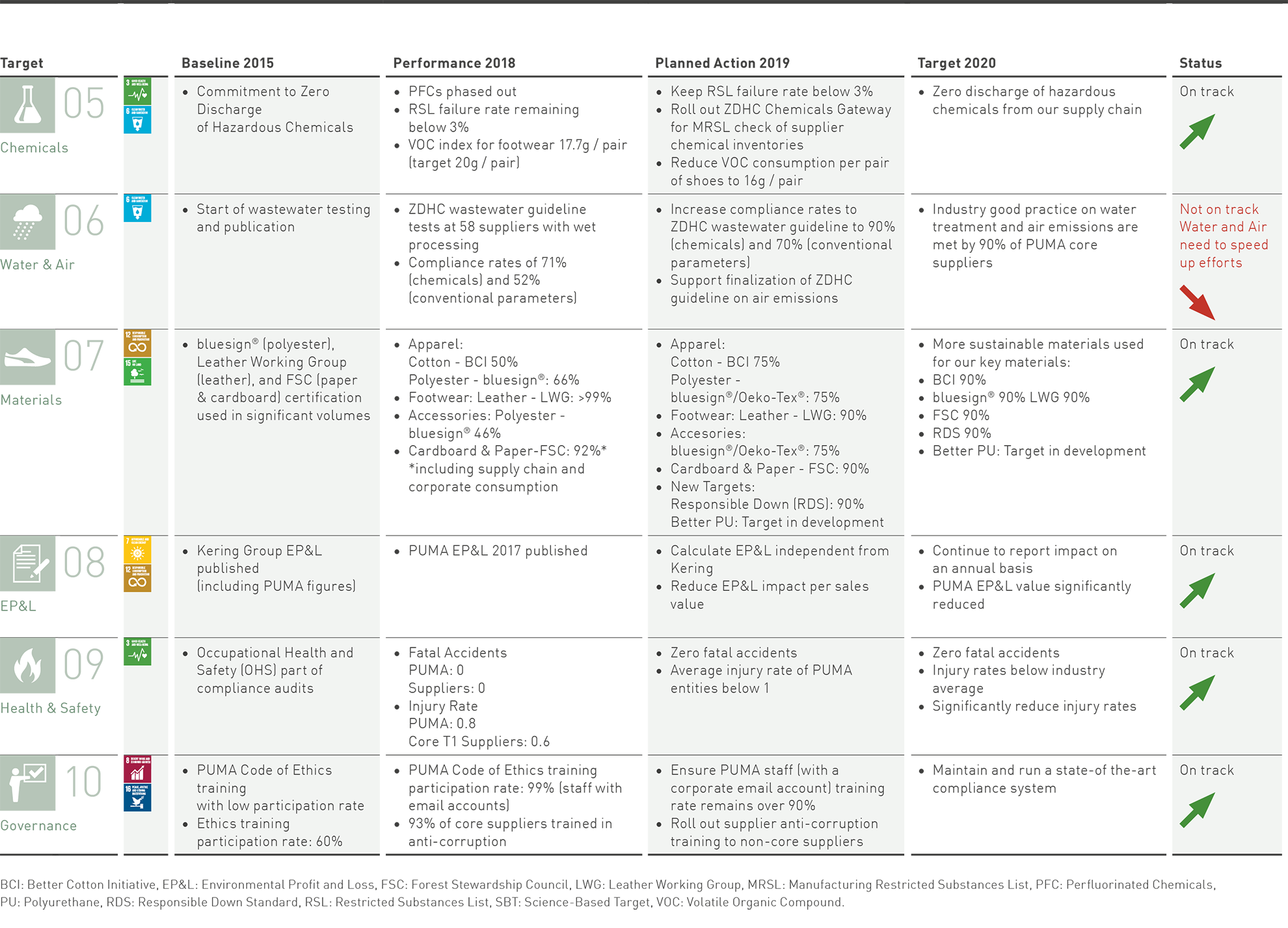Meaningful Progress and Impact
This report provides a summary of the progress we made during the calendar year 2018 towards our 10FOR20 Sustainability Targets, while also highlighting those areas where challenges remain.
Anticipating growing consumer demand for sustainably designed and produced lines of PUMA products, we emphasized enhanced research and innovation in this area. After many years of contributing to initiatives around improving the performance of our global supply chain, we are proud to report that several are now scaled up within the industry, including tools from the Zero Discharge of Hazardous Chemicals Foundation and the Social and Labor Convergence Program.
Furthermore, in a demonstration of our commitment to transparency, we have also published on our website the lists of our most important Tier 1 and Tier 2 suppliers.
Progress on 10FOR20 Targets
Now more than halfway through the five-year period PUMA allotted for meeting our 10FOR20 targets, 2018 was the time to take a critical look at our progress on each one. This inquiry found that we have made good progress thus far, with 8 of our 10FOR20 Targets on track. Below is a comprehensive table of our targets for each area, as well as the updated status of each:
Some highlights from our 2018 results are:
Direct results
- With the support of our material suppliers, we achieved our 2020 material targets for cotton, polyester, leather and cardboard at the end of 2018, two years ahead of schedule.
- Our worker complaints resolution rate remains above-target at 100%, reflecting the commitment our suppliers have made to building better workplaces by listening to workers and addressing their concerns.
- Our China-based suppliers have made progress on improving social insurance coverage for employees, and we will continue our efforts to partner with them to further improve coverage rates.
-
We launched the Partnership for Cleaner Textile program in Bangladesh on energy efficiency and renewable energy in partnership with the World Bank’s International Finance Corporation and our major suppliers in Bangladesh. This provides funding and pathways to lower environmental pollution and reduce operating costs for suppliers.
Better tools and tracking
- The Zero Discharge of Hazardous Chemicals – Wastewater Guidelines were rolled out to 58 of the wet processing units in our supply chain. This enables us to respond more effectively to situations where local water quality can be improved.
- We rolled out the new Sustainable Apparel Coalition Higg Index Environmental Facilities tool to 188 factories, allowing for the accurate measure and scoring of a supplier’s sustainability performance.
- We successfully piloted the assessment tool of the Social and Labor Convergence Program in China. Rather than using our own auditing tool, we thereby encourage further the use of shared audits, which made up 39% of our audits in 2018.
Remaining challenges
One goal of PUMA has been to publish science-based CO2 emission targets, which require an absolute reduction of greenhouse gas emissions in line with the Paris Agreement under the United Nations Framework Convention for Climate Change. While our emissions relative to sales are constantly being reduced, rapid business growth in recent years has made achieving an absolute reduction as an individual company challenging. Therefore, we worked with our industry peers and UN Climate during 2018 on an industry-wide climate change program. A result of these efforts was the launch of the Fashion Charter for Climate Action alongside 42 other signatories in December. One of the working groups formed during the Charters’ launch will develop a sector decarbonization approach – which will make it easier for PUMA to publish – and later on achieve – our own science-based emission target.
On the way to hitting our target of 90% compliance with industry good practices on water treatment, we currently stand at 71% for chemicals and 52% for conventional wastewater parameters, a clear indication that we must accelerate our efforts. For air quality we are still waiting for an industry standard to be finalized. This is planned by the Zero Discharge of Hazardous Chemical Foundation for 2019.
More Sustainable Products
In our continued focus on what our customers look for, we responded to increased demand for more sustainable products with the 2018 launch of a climate-neutral apparel collection in partnership with ASOS. In footwear, we won a PETA Vegan Fashion Award, while from an industry perspective, we achieved respectable ratings in a number of independent rankings including the Carbon Disclosure Program, Fashion Revolution, Corporate Information Transparency Index and Know the Chain.
Enhanced Transparency
We recognize the importance of transparency in our supply chain. As part of our commitment to facilitate it, we make publicly available the list of our core component and material suppliers (Tier 2) and our core suppliers (Tier 1).





